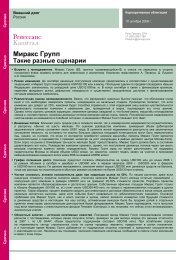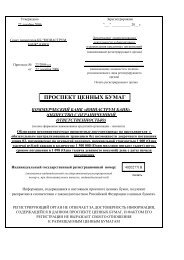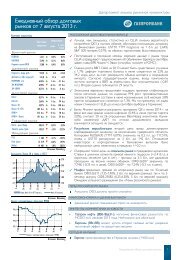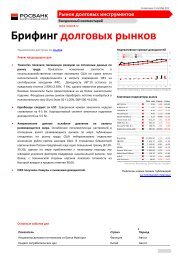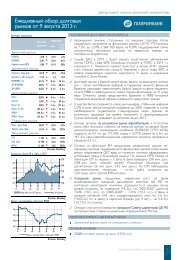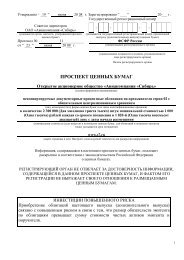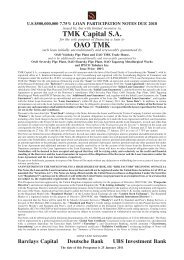(1) qibs that are qps (each as defined below) or (2
(1) qibs that are qps (each as defined below) or (2
(1) qibs that are qps (each as defined below) or (2
You also want an ePaper? Increase the reach of your titles
YUMPU automatically turns print PDFs into web optimized ePapers that Google loves.
Providers of traditional fixed-line telephone services and mobile operat<strong>or</strong>s <strong>that</strong> have obtained fixed-linelicenses may compete m<strong>or</strong>e effectively with us. The fixed-line market h<strong>as</strong> hist<strong>or</strong>ically been dominated bySvyazinvest in Russia, Kazakhtelecom in Kazakhstan, Ukrtelecom in Ukraine, Uzbektelecom in Uzbekistanand Tajiktelecom in Tajikistan, all f<strong>or</strong>mer state monopoly telecommunications services providers. These companiesand other established competit<strong>or</strong>s, such <strong>as</strong> Rostelecom, have some competitive advantages over our fixed-lineoperations, including:kkkksignificant resources and greater market presence and netw<strong>or</strong>k coverage;brand name recognition, customer loyalty and goodwill;control over domestic transmission lines and over access to these lines by other participants; andclose ties to national and local regulat<strong>or</strong>y auth<strong>or</strong>ities who may be reluctant to adopt policies <strong>that</strong>would result in incre<strong>as</strong>ed competition f<strong>or</strong> Svyazinvest, Uzbektelecom, Kazakhtelecom <strong>or</strong> Ukrtelecomand other hist<strong>or</strong>ically state-owned companies.On December 29, 2008, the Ministry of Communications and M<strong>as</strong>s Media adopted an <strong>or</strong>der establishing therequirements f<strong>or</strong> Mobile Virtual Netw<strong>or</strong>k Operat<strong>or</strong>s, <strong>or</strong> MVNOs. MVNOs <strong>are</strong> companies <strong>that</strong> provide mobilecommunications services but do not own the radio frequencies and, often, netw<strong>or</strong>k infr<strong>as</strong>tructure required to do so.Acc<strong>or</strong>ding to the <strong>or</strong>der, MVNOs in Russia must be licensed, and their use of frequencies and infr<strong>as</strong>tructure andrendering of services will be done pursuant to agreements entered into between MVNOs and existing frequencyholders. Competition from MVNOs may reduce our subscriber market sh<strong>are</strong> and revenues and could have a materialadverse effect on our business, financial condition and results of operations.Our failure to keep pace with technological changes and evolving industry standards could harm ourcompetitive position and, in turn, materially adversely affect our business.The telecommunications industry is characterized by rapidly changing technology and evolving industrystandards. We experience new customer demand f<strong>or</strong> m<strong>or</strong>e sophisticated telecommunications and Internet servicesin Russia, Ukraine and the CIS <strong>as</strong> well <strong>as</strong> f<strong>or</strong> other new technologies such <strong>as</strong> Internet Protocol, <strong>or</strong> IP, telephony andW<strong>or</strong>ldwide Interoperability f<strong>or</strong> Microwave Access, <strong>or</strong> WiMax. Acc<strong>or</strong>dingly, our future success will depend, in part,on the adoption of a fav<strong>or</strong>able policy and regulation of standards utilizing these technologies. Our success will alsodepend on our ability to adapt to the changing technological landscape. However, the rapid technological advancesin the telecommunications industry make it difficult to predict the extent of future competition. It is possible <strong>that</strong> thetechnologies we utilize today will become obsolete <strong>or</strong> subject to competition from new technologies in the future f<strong>or</strong>which we may be unable to obtain the appropriate license.We may not be able to meet all of these challenges in a timely and cost-effective manner. In addition, we maynot be able to acquire licenses, which we may deem necessary to compete <strong>or</strong> we may not be able to acquire suchlicenses on re<strong>as</strong>onable terms and we may not be able to develop a strategy compatible with this <strong>or</strong> any other newtechnology.On April 20, 2007, the Federal Communications Agency announced the results of three tenders f<strong>or</strong> awarding3G licenses and our company w<strong>as</strong> awarded a license f<strong>or</strong> the provision of IMT-2000/UMTS 3G mobileradiotelephony communications services f<strong>or</strong> the entire territ<strong>or</strong>y of the Russian Federation. The 3G license w<strong>as</strong>granted subject to certain capital commitments. The maj<strong>or</strong> conditions <strong>are</strong> <strong>that</strong> VimpelCom will have to build acertain number of b<strong>as</strong>e stations <strong>that</strong> supp<strong>or</strong>t 3G standards and will have to start services provision by certain dates in<strong>each</strong> subject of the Russian Federation, and also will have to build a certain number of b<strong>as</strong>e stations by the end of thethird, fourth and fifth years from the date of granting the license. Part of the frequency spectra related to the3G license <strong>are</strong> currently used by other commercial and governmental entities and our 3G netw<strong>or</strong>k development willrequire those entities to vacate those frequency spectra. Additionally, 3G netw<strong>or</strong>k development requires significantfinancial investments and there can be no <strong>as</strong>surance <strong>that</strong> our company will be able to develop a 3G netw<strong>or</strong>k oncommercially re<strong>as</strong>onable terms; <strong>that</strong> we will not experience delays in developing our 3G netw<strong>or</strong>k <strong>or</strong> <strong>that</strong> we will beable to meet all of the license terms and conditions. If we experience substantial problems with our 3G services, <strong>or</strong> ifwe fail to introduce new services on a timely b<strong>as</strong>is relative to our competit<strong>or</strong>s, it may impair the success of our3G services, delay <strong>or</strong> decre<strong>as</strong>e revenues and profits and theref<strong>or</strong>e may hinder recovery of our significant capitalinvestments in 3G services <strong>as</strong> well <strong>as</strong> our growth.33



